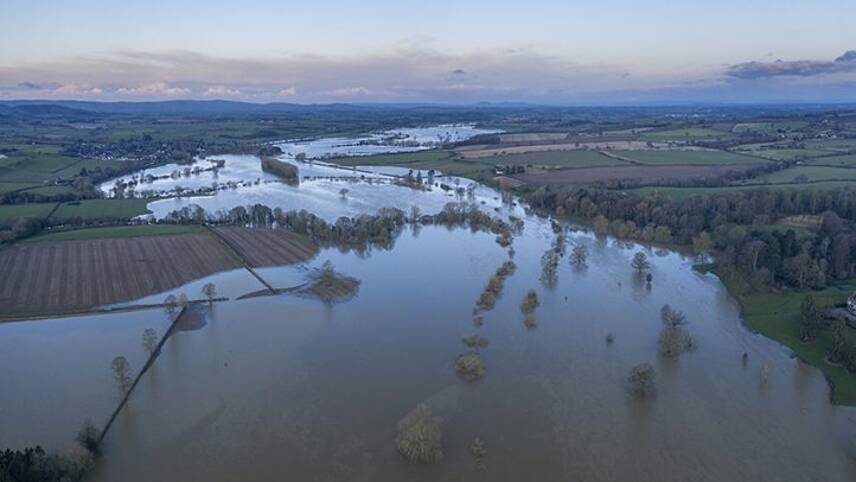Register for free and continue reading
Join our growing army of changemakers and get unlimited access to our premium content

Pictured: Flooding around the River Severn in Shropshire
The warning comes from a new landmark study, led by the University of Bristol and global water risk modelling leader Fathom, which pieces together a dataset that assesses flood hazards based on Met Office climate projections and modelled on historic flood risk figures based on river flow, rainfall, and tide-surge observations. These data sets were then matched with data on flood losses from the Association of British Insurers.
The research found that annual damage caused by flooding could increase by more than 20% over the next century due to the climate crisis. The researchers claim that this 20% increase would likely occur if nations fail to fulfil decarbonisation pledges to reach net-zero, many of which were agreed to at COP26. Meeting these climate pledges can see flood-related damages to property and businesses kept below 5% above historic levels.
However, failing to deliver net-zero targets could see the cost of flooding increase by between 13% to 23%.
Lead author Paul Bates, Professor of Hydrology at the University of Bristol and Chairman of Fathom, said: “For the first time this flood model gives us a more accurate and detailed picture of the impact of climate change on the risk of flooding in the future across the UK. The results are a timely warning to the country’s political leaders and business sector that global commitments to significantly reduce carbon emissions must be taken very seriously, and ultimately take effect, in order to mitigate increased losses due to flooding.”
The research also notes that some areas of the UK will face heightened flood damage risks, even under the best-case scenario where global pledges are met in full. Areas of heightened risk include South East England, South Wales, North West England and Central Scotland and cities such as London, Cardiff and Manchester. In these locations, annual damages could increase by more than 25%.
The Climate Change Committee (CCC) published an in-depth assessment of the UK’s exposure to hundreds of climate-related risks and its preparedness for these risks in 2021. The overall conclusions were concerning. Some 60% of the risks assessed were classed as requiring the highest level or urgency, up from 36% at the last assessment in 2016. No risks had decreased in urgency.
The CCC concluded that the Government was broadly failing to properly quantify and respond to the risks in a joined-up way, reminding policymakers that they should feel more of a sense of certainty that a certain level of adaptation will be needed in the coming decades. It also highlighted how this is an economic imperative, to avoid billions of pounds of annual damage costs, as well as an environmental, social and ethical must-do.
Last summer, the UK Government pledged £100m of new funding for frequently-flooded areas. The ‘Frequently Flooded Allowance’ should support around 80 flood schemes across communities which have been flooded at least twice in the past decade. The focus will be on preventing flood-related damage rather than stopping floods in the first instance or reducing their severity.
The funding for the pot is being pulled from the Environment Agency’s annual budget. The Agency funnelled £2.6bn into flood schemes between 2015 and 2021 and should receive £5.2bn for allocation on flood schemes between 2022 and 2027. Defra is targeting the delivery of 2,000 flood schemes by 2027, noting that many of the new schemes will need to be “smaller and more complex” due to the geographic location of the most-affected areas.
Commenting on the research, co-author Dr Oliver Wing, chief research officer at Fathom said: “This study, which harnesses new data and the very latest modelling techniques, validates Fathom’s UK Flood Map and has given a new level of insight into the impact of climate change on flooding in future.
“The modelling provides clear evidence that flood risk needs to be a bigger international priority and that current governance doesn’t go far enough. While the majority of the nation’s future flood risk already exists today, it is strongly in the UK’s interest to exercise leadership in global carbon emission reduction efforts, both by example and as part of global diplomatic initiatives.”


Absolutely, but it is politicians who make the decisions, not scientists.
Richard Phillips